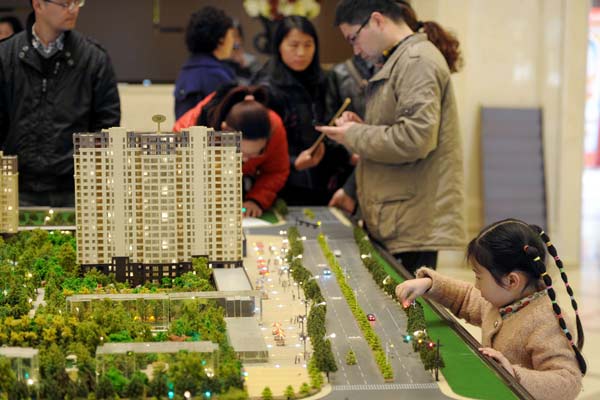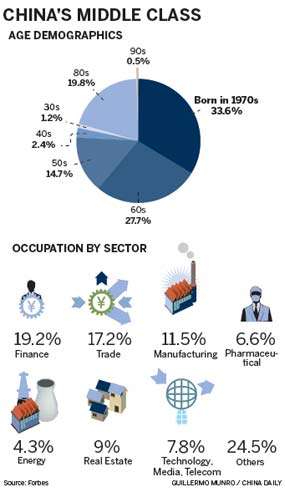Middle class willing to spread investments beyond property
Updated: 2013-03-29 02:22
By SHI JING in Shanghai (China Daily)
|
||||||||
|
 |
|
Property buyers look at real estate models in Hangzhou, Zhejiang province. According to a report by Forbes China, 96.7 percent of the Chinese middle class own apartments. Dong Xuming / for China Daily |
The Chinese middle class — the main driving force behind national consumption — is growing rapidly and investing in many areas of the economy, not just property.
 So says a report from Forbes China, which now identifies the country's middle class as those with "investable" financial assets worth between $100,000 and $1 million.
So says a report from Forbes China, which now identifies the country's middle class as those with "investable" financial assets worth between $100,000 and $1 million.
Its Chinese Mass Affluent Group Report 2013, released on Thursday, said their financial assets are spread across cash, deposits, securities, funds, bonds, insurance and other financial wealth management products, as well as individually held property.
Over the past four years, the total financial assets of the Chinese middle class remained at 1.33 million yuan ($213,900) per capita, said Shi Guowei, research director of Forbes China, who co-wrote the report.
The numbers reached 10.26 million by the end of 2012 and are expected to rise to 12.02 million by the end of this year.
Zhou Jiangong, the editor in chief of Forbes China, added: "The Chinese middle class has been overlooked in the past few years, but they are playing a significant role in the economic and social development of the country.
"As urbanization proceeds, the Chinese mass affluent, or the middle class, will of course expand."
"The ways the Chinese accumulate their personal wealth have been oversimplified, in that property became the most popular means of investment.
"There really is a lack of diversity in financial products with fixed income due to the country's little-developed interest rate marketization and the infantile asset-backed securitization.
"There is a huge amount of deposits, while domestic consumption has not yet been boosted," said Lyu. "But there will be an undisputable growing need for wealth management products in future."
However, the middle class still demonstrated a strong willingness to invest.
The report said 88 percent of respondents said they had used their assets to invest in different areas, in the hope of expanding their wealth.
But at the same time, about the same number said they preferred low-risk investment options, with many buying wealth management products, funds and securities.
Private company owners made up 49.4 percent of the respondents, with the majority of the rest classifying themselves as State-owned or multinational company executives, or professionals such as lawyers.
Although most wish their children to pursue overseas study, 75 percent said they have no plans to migrate themselves, largely because their companies rely on the Chinese economy, said Shi.
Yang Xiaolong, chairman of Zhejiang Gete Clothes Co Ltd, moved to France in 1990 to start manufacturing jeans. But he returned to China in 2000 to export garments.
"It is better to stay in China for the sake of convenience, and for the business opportunities," said Yang.
shijing@chinadaily.com.cn

 Li Na on Time cover, makes influential 100 list
Li Na on Time cover, makes influential 100 list
 FBI releases photos of 2 Boston bombings suspects
FBI releases photos of 2 Boston bombings suspects
 World's wackiest hairstyles
World's wackiest hairstyles
 Sandstorms strike Northwest China
Sandstorms strike Northwest China
 Never-seen photos of Madonna on display
Never-seen photos of Madonna on display
 H7N9 outbreak linked to waterfowl migration
H7N9 outbreak linked to waterfowl migration
 Dozens feared dead in Texas plant blast
Dozens feared dead in Texas plant blast
 Venezuelan court rules out manual votes counting
Venezuelan court rules out manual votes counting
Most Viewed
Editor's Picks

|

|

|

|

|

|
Today's Top News
Boston bombing suspect reported cornered on boat
7.0-magnitude quake hits Sichuan
Cross-talk artist helps to spread the word
'Green' awareness levels drop in Beijing
Palace Museum spruces up
First couple on Time's list of most influential
H7N9 flu transmission studied
Trading channels 'need to broaden'
US Weekly

|

|







